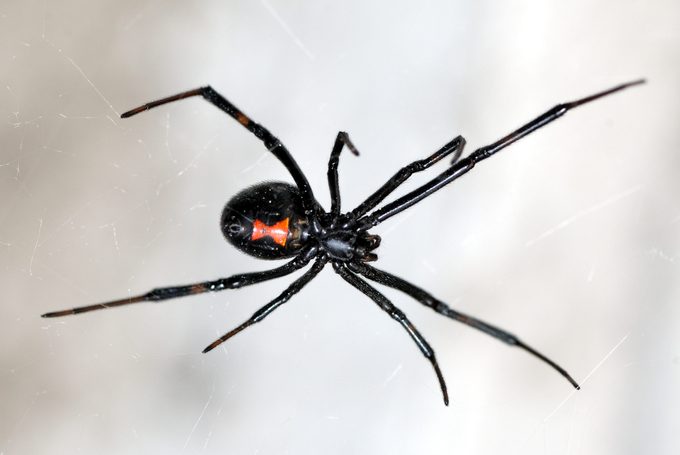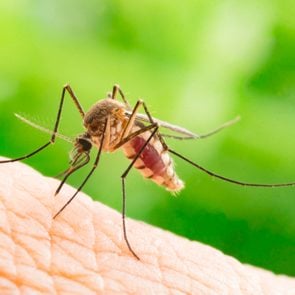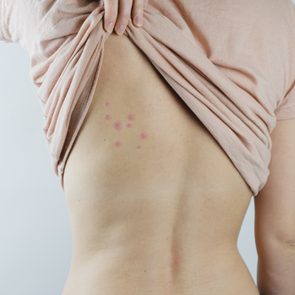Black Widow Spider Bites: What They Look Like and How to Treat Them
Updated: Mar. 30, 2022
Black widow spider bites are venomous, but rarely fatal to humans. Here's how to recognize the spiders, avoid them, as well as symptoms and pictures of bites.
Our editors and experts handpick every product we feature. We may earn a commission from your purchases.

Black widow spiders are notorious for two things—eating their mates (if the guys don’t leave quickly enough after mating) and their venomous bite. Yes, the female’s venom is fatal for her mates and the insects she kills, but the good news is that it is rarely fatal to humans.
Don’t know how to spot a black widow or if you got bitten by one? Here’s what experts want you to know about these types of spiders and their venomous bites.
Where black widows live
Black widows live in temperate regions of the United States, mainly in the South and West. They prefer a solitary and quiet home, setting up shop beneath porches, sheds, garages, woodpiles, and basement window wells. Though most often found outdoors, a black widow might find its way inside when you carry in boxes from the garage and flower pots or patio furniture you bring in for storage.
Identifying a black widow
The spider has a shiny black body with a reddish-orange hourglass-like pattern on the underside of her belly (for some, it may be a series of dots); the body can be about one and a half inches long. Males are just half that size and usually brown or gray. A black widow’s web snares flies, mosquitoes, and larger prey like grasshoppers that the widow eats, which is beneficial to humans because it means fewer annoying pests. Their webs are so strong that they were used to make crosshairs in gun sights during World War I and II, explains Rick Vetter, retired entomologist, University of California, Riverside.
How poisonous are black widow spiders?
The same venom the spider uses to inject, paralyze, and kill insects isn’t as lethal on humans, though it can be more likely to cause systemic problems compared to a brown recluse spider bite. “It is exceptionally rare for a fatality to occur from a black widow bite, says Andrew Stolbach, MD, MPH, associate professor of emergency medicine, Johns Hopkins University School of Medicine, Baltimore. A black widow’s bite can trigger some not-so-pleasant symptoms, such as burning and swelling at the bite, along with nausea and headaches (see below for the complete list).
How do I avoid getting bitten?
By their very nature, black widows prefer to live in areas that are largely undisturbed. They’re not interested in seeking out humans because they don’t require our blood for food like bed bugs, ticks, fleas, or mosquitoes. Contrary to popular opinion, black widow spider bites are actually rare. According to arachnologist, Sebastian Alejandro Echeverri, PhD, at the University of Pittsburgh, the black widow would rather scurry off than bite someone. “There was a study where scientists tried to get a black widow to bite to see exactly how dangerous they are. It turns out, none of the spiders would bite if poked and allowed to run away. And even when held by the head and squeezed, many of them still refused to bite. And of those that did, many didn’t inject any venom,” says Echeverri.
How bites happen
So when does a black widow bite? Black widow bites are an act of self-defense arachnologist Catherine Scott, PhD, at Acadia University in Wolfville, Nova Scotia, Canada. Most commonly it happens if a hand, arm, foot, or another part of your body is trapping the spider and it can’t escape. “Black widows pretty much stay where they are. A female will be on her web and just hanging out there, but if you turn on the light or open the door to a shed, she will probably run into a corner and hide in a little retreat,” says Dr. Scott.
Preventing black widow bites
If you’re in an area where black widows live, check before you reach into a woodpile or something in the shed. For clothing that you store in a shed or basement, shake it out before you put it on. “Leave them alone, and they will leave you alone,” says Dr. Scott. If you’re going to be doing some spring cleaning in the garage or working near black spider hangouts, protect yourself by wearing shoes, gloves, long pants, and even spraying on some chemical-free bug repellents, just in case.

How do I know a black widow bit me?
You might not know a black widow was the culprit for the pinprick you suddenly felt unless you saw the spider after it bit you, or if you inadvertently killed it with your hand or smushed it with your foot. To accurately diagnose a black widow spider bite, you need the spider—dead or alive so an entomologist or medical toxicologist can identify the bug. By the way, never try to capture or pick up a black widow without a garden glove or other protective glove on. Whether it is dead or alive, place the spider in a resealable bag and place it in the freezer until you can see a doctor. You may also find this bug-bite guide helpful in identifying what got you..)
What are the symptoms of a black widow bite?
According to Johns Hopkins, these are the most common symptoms:
- Immediate pain, burning, swelling, and redness at the site
- Cramping and muscle tension in the stomach, chest, shoulders, and back
- Headache
- Dizziness
- Rash and itching
- Anxiety and restlessness
- Sweating
- Nausea or vomiting
- Eyelid swelling, watery eyes
- Weakness, tremors, or paralysis, especially in the legs
https://www.instagram.com/p/mVRbP5PtA3/?utm_source=ig_embed
I think a black widow spider bit me: What now?
Again, it’s challenging to confirm a black widow spider bite, but if you’re certain, most of the time, you can treat it at home. If the symptoms are severe, call your doctor or head to the emergency room, says Dr. Stolbach says. “The problem is almost never the local area of the bite. The problem is the pain created by the venom. Some of the envenomations—the venom from the spider—can be extremely painful, in which case you should absolutely go to a hospital and get treated. The pain and cramping can get really bad and travel up the body,” he explains.
How can I treat a black widow bite?
If you only experience mild symptoms, wash the bite area with soap and water, apply an ice pack, and take over-the-counter pain killers such as acetaminophen or ibuprofen if you need them. Definitely give your doctor a call if you think you might be behind on your immunizations: Tetanus spores can compile inside the bite, and you need a tetanus booster at least once every 10 years.
With more severe symptoms, doctors may recommend medications such as benzodiazepines to treat muscle spasms and pain—especially for children since their reaction can be more intense due to their smaller size. Antivenom is also an option, according to experts at the American College of Medical Toxicology, but the treatment carries risks because it can trigger allergic reactions. Doctors would only consider it if the person were in extraordinary pain and not responding to treatment, says Dr. Stolbach. Most complications from the bites will resolve in a day or two, he says. (Next, read the best ways to treat every type of bug bite.)
























